#RGU analysis
Explore tagged Tumblr posts
Text
Touga's ghost in "Adolescence of Utena" was trying to take Utena with him, killing her in the process, instead of helping her out. And it wasn't even Touga as a character, but rather as the idea of "chivalry" or being a hero.
Yeah, when Touga was alive, he saved Juri because he was a decent guy, but he also did it in a dangerous way because he had no attachment to life and wanted to die. In reality, knights don't exist. They're an ideal. There are no knights. There are, however, people who seek to help others and who also need help. If you seek to be a knight, you end up taking agency away from the people you try to "save" and damaging yourself under impossible standards. And the ghost of chivalry/the idea of the hero sought to drown Utena in the guilt of not being able to live up to those standards and in being stuck always trying to do so while burying her own humanity. She realizes this and tenderly dismisses the idea by her own choice with a goodbye kiss because, after all, she recognizes how it helped her at the time. But, like any self-damaging coping mechanism, it hurts her, and that's why she lets it go.
#revolutionary girl utena#rgu#rgu analysis#adolescense of utena#shoujo kakumei utena#touga kiryuu#utena tenjou#rgu utena#rgu touga#character: kiryuu touga#character: tenjou utena#r: utena and touga#gru post#my ex didn't get this back then and omg I should've left him earlier
569 notes
·
View notes
Text
(incomplete) Utena analysis recommendations
@wherefore-whinnies, here are some good RGU essays & videos I've found! Anyone who has other recommendations, please feel free to add!
@empty-movement's analysis page is where I've found the most good essays (besides randomly searching the rgu analysis tag on tumblr). There's a TON of stuff that I most definitely have not read all of, but some of my favorites/most relevant ones include:
Playing Prince (on Utena's prince complex)
Motive and Source (on the Student Council members' reasons for dueling)
Pulling Swords Out of People (on the Black Rose duelists and their relationships with the Student Council members)
For the Garden Where All Love Ends (on the Black Rose Saga as a whole; page 2 is linked from this page)
Body as a Bargaining Chip (a really interesting one about Anthy & Touga)
To Make an Omlette You Have to Crack Some Eggs (on the Nanami's Egg episode)
And here are some YouTube series I like:
The La Duelist Series by The Digital Dream Club (one video for each of the 5 student council members)
Zarinthel's Utena analyses (explores a variety of Utena themes in pairs)
Crabe's Utena analyses (mostly in-depth looks at very specific subjects/scenes)
I haven't read/watched these in a while, so there's a small chance some of them have content I no longer agree with. Also, I'll try to add some more in the future!
531 notes
·
View notes
Text



Let's continue the analysis and talk about utenas house. This house is a real house in tokyo.



This house belonged to Yukio Mishima, a famous japanese novelist post World war 2, who almost got a nobel prize and later committed suicide after he failed a REVOLUTION to return the full Power of the Monarchy. (So in a way, he wanted to restore the powers of the prince.😅) Mishima was also famously gay but at first tried to hide his homoeroticism as an appreciation of Heroic masculinity. He detailed this aspects of his life in his autobiography Confessions of a mask. According to some Bonus Material, that book was an influence on Arisugawa Juris character. (Who in the series hides her lesbian Feelings for Shiori.) Interestingly, the book also Talks about Jeanne Dark and because Juri is basically Utenas variant of Lady oscar,, there is a small connection here as well.

Mishima also wrote his magnum opus, the Sea of Tranquility tetralogy. This book has themes if cycles, illusions, princes and revolutions (in multiple ways to interpret.)
One of the biggest metaphors of the book is the idea of the prince as an amoral figure. (Inspired by Macchiavellis book the prince, where the title, the prince, is also a symbol for Lucifer. And in Utena, akio is connected to the morning star. Because the morning star appears close to the sunrise, in ancient times, he was called the light bringer, e.g. Lucifer.)
This series of four books describes history as a cycle/revolution of four ages with each book depicting one age and one season of the year.
The book was influenced by Buddhism. The protagonist in the book, Honda, wants to save his friend Kiyosaki who is trapped in a cycle of revolution, rebirth and suffering.
In the first book, Kiyosakis suffering and death come from him loving a girl named Satako, but Satako being forced to marry a psychopathic, abusive prince. The first one already has themes which remind on Utena.😅
The second book depicts Kiyosaki as a revolutionary who wants to restore the glory of the Monarchy because he fears the influence of megacapitalists on Japanese society and morals. Honda wants to save him from his death.
In the end, its stated that Growing societal nihilism and apathy destroyed the possibility of heroism in society and this is why his Revolution failed. As I already said, Utenas opening Rinbu Revolution touches on exactly these themes.
The third book has one plot element certain parts of my Readers will find interesting and maybe funny. (Especially the crowds with a certain blue and pink flag on their page.😅)
Because in this book, Honda travels to Thailand, meets Kiyosaki again and sees he is now a woman (!).
He was reborn as a Princess in Thailand and later, they start a sexual relationship. Later, she dies due to being bitten by a snake and her death was foretold in visions.
In the last book, Kiyosakis "final reincarnation" now becomes a villain and an abuser and deceiver lead by hatred, lust for revenge and lust for Power, who frequently manipulates and harms women. He is also called a fallen prince and a fallen angel. (This final Reinkarnation strongly reminds on Akio. But it also reminds on Anthys brief betrayal in the end of the series.)
Interestingly, Honda realizes that him trying to save Kiyosaki and his reincarnations was a mistake and he was unable to save him. And while in past, he thought he acted out of a divine mission, he now realizes that this was delusional and selfish desire clad in romantic stories of Heroism. Just like how in Utena , she and many other characters have the same realization.

In many of mishimas books, temples and other places become quasi mythical, dreamlike, heavenly places of desire. This reminds on Dios castle.
#anime#japan#rgu analysis#rgu#utena tenjou#utena analysis#shoujo kakumei utena#revolutionary girl utena#yukio mishima#juri arisugawa#dios#akio ohtori
495 notes
·
View notes
Photo



Isn’t it awesome when the porn you want gets translated??? Thanks to Nagumo, these are the translated production pages of the Musical Utena ~ Blooming Rose of Deepest Black program! The stage art one is brand new and probably my favorite, it’s fascinating to see how they did the show.
#utena#revolutionary girl utena#rgu analysis#sku analysis#black rose musical#blooming rose of deepest black#utena musical
238 notes
·
View notes
Text
Just realized that akios office has big window arches, allowing anyone to see in, but most importantly, for akio to keep watch. It's a show of status and power.

It also made me think of how anyone could see in, but it's so far up you would need to be looking really closely to really know what's going on. Something something how this relates to akios abuse of anthy, and abusive victims in general. Something something untrained eyes don't recognize abuse
185 notes
·
View notes
Text
dunno if it’s already been said before but it’s fascinating to me that Akio is the only character whose identity and role concretely changes with his name. He was Prince Dios, once, in a better time. He is now Akio, Corrupt Chairman of Ohtori Academy. to the student council, and, for a time, to us, he’s The End of the World, a figure so nebulous and shrouded in mystery they might as well be an abstraction. meanwhile Tenjou Utena and Himemiya Anthy, whose characters also symbolize and embody multiple roles/tropes don’t do that. when Utena transforms into a Duelist, when she’s interacting with Akio or anyone on the stuco, she’s still Tenjou Utena. whether Anthy is playing the part of the Rose Bride or a shy, hapless student, she’s still Himemiya Anthy. from here on is just my interpretation, but i think there’s another layer to this when you consider how the name “End of the World” is an alias that Akio uses to refer to himself. he wants the characters to think there’s nothing beyond him, he IS the world, he is the narrative endgame, and trying to venture past that point is futile. (thinking about the final scene of AoU where anthy and utena LITERALLY escape the world of Ohtori and confront Akio one last time before they do so...)
#rgu#rgu analysis#revolutionary girl utena#revolutionary girl utena analysis#sku#sku analysis#shoujo kakumei utena#shojou kakumei utena analysis#codeword: revolution
167 notes
·
View notes
Text
Subplot of Utena episode 2
(aka, Utena's flaws spelled right in front of you in the beginning.)
Let's start with ChuChu, Anthy's weird monkey thing.

It's a tiny useless monkey, sometimes useful to Anthy, but mostly it just eats a lot. (Like, alot.)
It's representative of an aspect of Anthy's relationship with her brother, Akio - it's a lilac-colored thing wearing an earring and a red business suit (or tie). It's introduced with the 'Prince' framing that follows the other duelists, or other romance fairytale moments.
It's also absolutely ridiculous, because this thing is just a monkey with an emplaced sense of importance. (Just like Akio is just a egotistical human being using his sister/children to make himself important.)
With background on ChuChu out of the way, let's talk about Anthy.
Anthy's trying her best to form a connection with Utena.
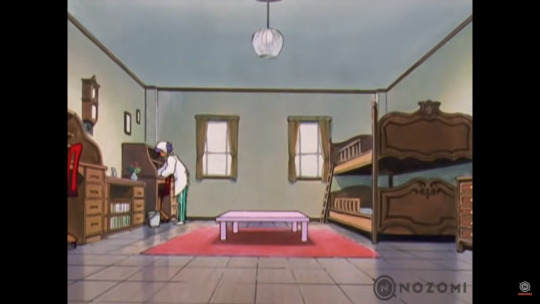
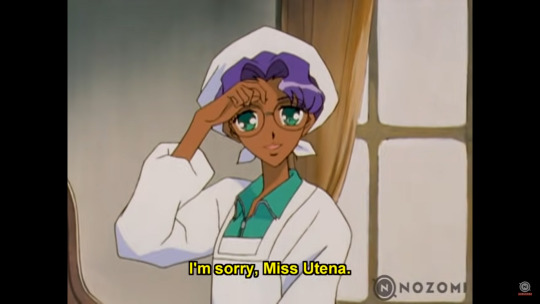
(Anthy cleaned up Utena's dorm room, which was completely trashed. Possible magic aside, that's not a light thing to do. That's... a very heavy act of care.)
This makes sense - Anthy is the Rose Bride, she's gonna spend a lot of time with her Engaged - better get on their good side first, and ensure a good relationship between the two.

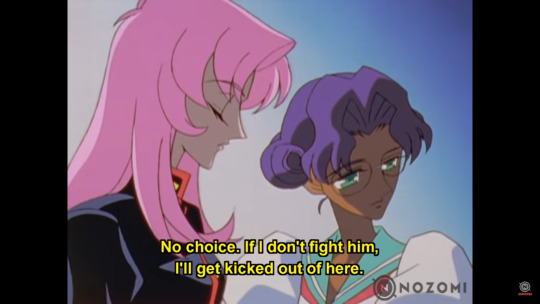
And there are ALSO SO MANY duelists who would treat Anthy terribly, so better pay for Utena's loyalty while she can.

In Utena's defense, being suddenly tasked with the protection of a weird, slightly obsessive girl with loyalty issues is a Big Deal, and not something to take lightheartedly.
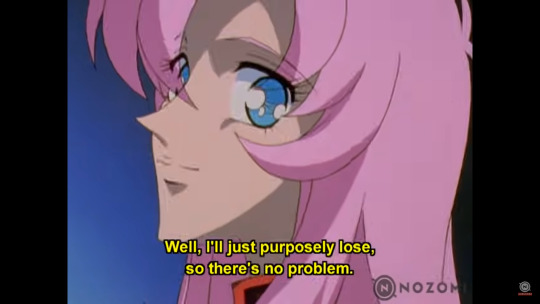
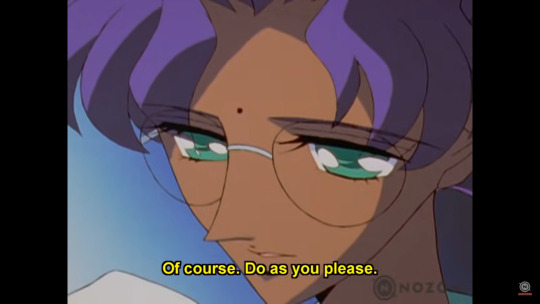
On the other, losing a duel where said girl's abusive ex will own her back is fundamentally a Jerk Move.
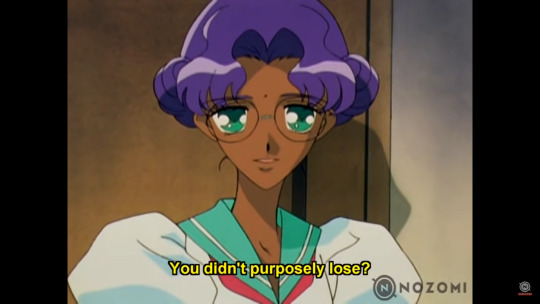
But it doesn't matter, because Utena decided in the end, to continue fighting for Anthy, against the other duelists who would take advantage of her.

Or did she?
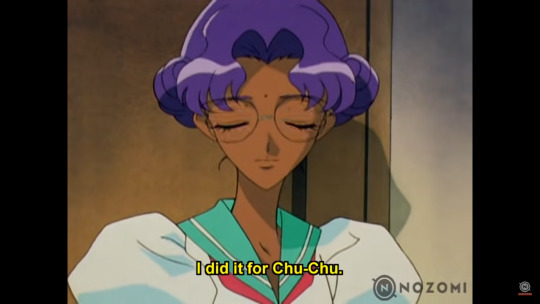

Ow.
Utena openly stated she cared more about the annoying representation of your Prince brother than she did about your own autonomy.

How selfish. She cares more about her own pride as a 'Prince' than actual kindness.


Anthy can play that game too.
#rgu#no thoughts head empty - i want to answer this but it's been a bit#want to clarify though - chuchu isn't akio#chuchu is a prince#and all princes in ohtori are modeled after akio - including utena#and yeah#i think anthy thinks princes are cute/lazy/innocent#regarding saionji stepping on chuchu - that signifies an attack to utena's pride/ sense of honor#interesting to note that chuchu tends to suffer whenever a 'prince' approaches anthy - saionji specifically#or when anthy is talking about akio - chuchu expresses fear in those sitatuations
-keeping this amendment
#rgu#revolutionary girl utena#shoujo kakumei utena#rgu analysis#rgu meta#rgu spoilers#revolutionary girl utena spoilers#< sure#soilai's labyrinth
121 notes
·
View notes
Text
RGU and the American Romanticism movement
“If it cannot break out of its shell, the chick will die without being born. We are the chick, the world is our egg. If we don't crack the world's shell, we will die without being born. Smash the world's shell, for the revolution of the world!” Is the speech given at the beginning of every single student council meeting in Revolutionary Girl Utena By Kunihiko Ikuhara is a surrealist shoujo anime from 1997. Now you may be wondering what an anime from 1997 has to do with the American Romanticism movement, but I argue by examining other romantic texts that Revolutionary Girl Utena would fit the ideals that formed the Romantic movement perfectly. The series is a deconstruction of fairytale tropes and analyzes how institutions are built to hurt and take advantage of through the lens of princes and princesses as well as through how the school setting shapes people to recreate and continue the ideals of the institution.
“Young Goodman Brown” by Nathaniel Hawthorne is a short story about the danger of laying all or your core beliefs onto one single thing will ultimately be your own undoing when this world view is contradicted. When Goodman Brown’s perception of everyone around him that has been built up by the image the church portrays is contradicted on his walk he is unable to cope and ultimately “his dying hour was an hour of gloom.” (Hawthorne). In Revolutionary Girl Utena the titular character has built her identity up through acting the role of a fairytale prince, and when some mishaps happen and she accidentally gets herself entangled within a dueling system where the winner becomes engaged to a girl named Anthy Himemiya who has this power to “revolutionize the world” she is at first very against this system, but once she learns that if she loses someone else who might not treat Anthy as kindly as her will be engaged if she drops out she decides she has no choice to continue and eventually she ties being the victor of these duels to her princely identity. Then in episode ten she loses and her sense of self is shattered, she stops dressing in her usual boys uniform and insteads ops wears the girls uniform and she is noticeably less confident and happy this way. She gets talked back into dueling to take Anthy back and succeeds, however this cements her sense of self as being tied to this institution from this point until near the end of the series.
The anime explores ideas of needing to accept one’s past with a heavy emphasis on death. In the black rose arc Mikage is a young genius who is so fixated on his past that he attempts to gain the power to revolutionize the world to unlock a form of eternity built upon his memories.To achieve this eternal state of being he killed a hundred duelists in a fire. Through his duel the truth of his past is revealed and he disappears from the world as a whole, Mikage is also heavily implied to be a ghost throughout the anime. Even the titular character has a strong connection to death as both her parents died when she was little and she was so distraught that she hid within a coffin until a prince came and showed her something to fight for. The stanza “So live, That when thy summons come to join the innumerable cavern, (...) Thou go not, like the slave-quarry in the night,” “Thanotopsis” by William Cullen Bryant encapsulates this moment well as it shows the mindset Utena has to go through, she can’t just lay down and die she must fight for something to hope for her life to mean something. Speaking of what she is fighting for.
It is revealed in episode 33 of Revolutionary Girl Utena that the thing that Utena is fighting for and the reason she became a prince was to save Anthy who has been cursed to be stabbed by the hatred of all of humanity for eternity and prince Dios could not be her prince to save her due to them being siblings. Utena swears to be this prince to save her. However, Utena forgets the memory and gets caught up in the dueling game and although she is kind to Anthy and never does anything to hurt her, she also never notices any of the pain and suffering Anthy is enduring. This creates a wedge between them until they confront each other on the rooftop as Anthy tries to jump off, Utena stops her and they have a heart to heart about how they’ve both been hurting each other and they promise to continue to stay for each other and that they will get through this. Then in the final duel between Akio/Dios who represents exactly who the institution has been built for as well as the patriarchy, Anthy is overwhelmed because Akio is her brother and is the only person who has seen her suffering and despite him allowing and enforces the institution that allows her suffering to continue for the benefits of others he still swears he loves her, so she betrays Utena and literally stabs her in the back. “I aimed my Pebble---- but myself was the one that fell--- Was it Goliath---- Was too large--- Or was myself---- too small?” “I Took my Pebble in My Hand” by Emily Dickinson exemplifies this moment as Utena falls to the floor.
However after Akio fails to utilize the power to revolutionize the world, because the system is already built for him and deep down he doesn’t desire for anything to change, Utena stumbles back to her feet and clambers over to the gate where the power to revolutionize the world is supposedly held and begins to beg and cry for someone to help Anthy. This is not built upon her desire to seem like a prince or show off; this is simply an act of concern for the girl she loves, and thus the gates open and inside is Anthy alone and afraid After finding Anthy, Utena vanishes from the world, but Anthy remarks that Utena is still out there and that she simply left the oppressive institution that Akio built. With the security of Utena’s unwavering love even after seeing all Anthy has gone through and everything she’s done, Anthy understands what true love is and finally is able to take that first step and leave behind the institution that confined her in search of Utena and also herself and who she can be without everyone else's expectations of her clouding it.
104 notes
·
View notes
Text
when we say RGU is about "the cycle of abuse", we refer to gender-based violence, particularly perpetuated through "romance" (or a manipulation of it), and even more particularly through incest and grooming—and i have no intention of erasing that because it clearly is the central theme of the show. but part of me wants to focous on the idea of RGU representing political cycles, too. on taking the word "revolutionary" by its communist meaning. because weirdly enough, the way the anime conceptualizes time, history/myth (if they can even be separated), eternity and cycles is so....marxist?
i can't stop thinking about utena as a girl born within a system that lives off of exploitation—akio's exploitation of anthy as the archetype, and all others who emulate it. and she is so desperate to liberate her from that exploitation, to revolutionize ohtori. she is full of drive and good intentions, but so were all the other duelists that came before her. all the others that upon reaching the last duel—the duel named Revolution—allegedly were told by akio give up your sword, abandon your aspirations to revolutionize the world, and instead join me as my bride at the top of the tower. and they did, only to last two or three years as akio's chosen princesses—like kanae (re: The Palace Perspective)—and then be discarded. like so many socialists that get convinced by parliamentary social-democracy and abandon communism for reformism, only to last what? a brief decade-long political cycle and then get replaced. the Podemos and Sumares. the Die Linke to be. all leftist parties in mult-party systems that claim to be moved by good intentions but end up achieving nothing because they don't pose an actual alternative to the bourgeois system—they've just joined it. and the cycle continues.
except with utena, the cycle breaks. because she refuses to participate in the exploitation, rejects the system, and leaves to find an alternative. she is utena, the revolutionary girl, in the communist sense. her actions destroy ohtori entirely—as the school's power is founded on convincing its prisoners it is the only real world. ohtori is a parallel to capitalism in this case (bear with me on this).
in the post-soviet era, after the existing alternative of a socialist state was crushed, there spread a general idea that. this was it. "there was no other alternative", as Margaret Thatcher's campaign motto kindly put it. socialism didn't work in the USSR, which means it will never work, and we are stuck with capitalism forever. this thesis is famously developed in Mark Fisher's Capitalist Realism, that picks up from Zizek and Debord's concept of the "perpetual present" (*). it is also the control device akio uses to get no student to leave, trapped in the stasis of adolesence forever, where they are easily exploitable. that is, until utena reminds them that an alternative is possible, that abandoning the exploitative system is feasible. you could say she restored class consciousness.
this ties into RGU's thesis of "eternity as something fake", too. in a way that this post explains better than i could:
"There is no such thing as something eternal" is reframed as a positive. eternity is Not Good. eternity is everything staying the same forever, never changing for the better. it's the opposite of revolution. it's what akio wants, perpetuating the system that benefits him at the cost of everyone else forever and ever. and no matter what utena might have thought, it is not what she wants. —transmascutena
"Perpetuating the system that benefits him at the cost of everyone else forever and ever" is just capitalism. and the relationships of abuse he subjects his students to should be understood as an iteration of capitalist relationships of production (not literally, as students aren't workers akio is stealing surplus value from. im just trying to say the dynamics of exploitation are very much the same im both cases). ohtori isn't eternal. ohtori is the opposite of revolution. capitalism is just the same. and utena's role within the story is to shatter it.
and there's also the whole double meaning of revolution RGU uses, that is also so post-soviet (or postmodern if you want to open the chronological window). revolution as change, and revolution as cycle. but aren't those contradictory? once upon a time they were, when marxist's viewed history as a linear succession of modes of production. slavery > feudalism > industrial capitalism > communism. a stable accumulation of progress, if you will. but pretty much no marxist stands by that conception today, except they very dogmatic ones. instead we see revolutions—revolutionary experiences—and a part of a cycle. things change, but the change is not final, not stable. we must continue to polish our methods, change again and again in the future. instead of linear history, a spiral. hopefully a staircase going up.
and we could interpret "nothing is eternal" in a different way too. marxian thought was based upon a specific idea of "man", a supposition of what "human essence" entailed—allegedly stable from the appearance of homo sapiens till the explosion of the sun—that guided Marx when envisioning the future under communism. and what is eternity if not that? an essence that remains unchanged no matter how far into the past or the future you go? post-soviet times have destroyed any belief in an unchanging "human essence". nothing stays forever. RGU shares this vision too, trying to chase eternity—or human essence—is futile. though i admit this point is more controversial philosophically speaking as some people still do consider "human essence" to be worth defining.
(*) and to warp it up, i bring up Debord because his Society of the Spectacle has definitions of history, spectacle, myth, eternity, cyclical time....so similar to RGU's. im not going to get into it because the audience for this post is already basically just. me. but maybe another time. here's a sneak peak from Theses 127 & 131 so yall get what i mean. read this while thinking about the Himemiyas as mythical (whether genuinely, or as akio's pretension doesn't really matter, because he weaponizes it either way) and using their magical role in the story to shape it world:

Eternity is within this time, it is the return of the same here on earth. Myth is the unitary mental construct which guarantees that the cosmic order conforms with the order that this society has in fact already established within its frontiers.
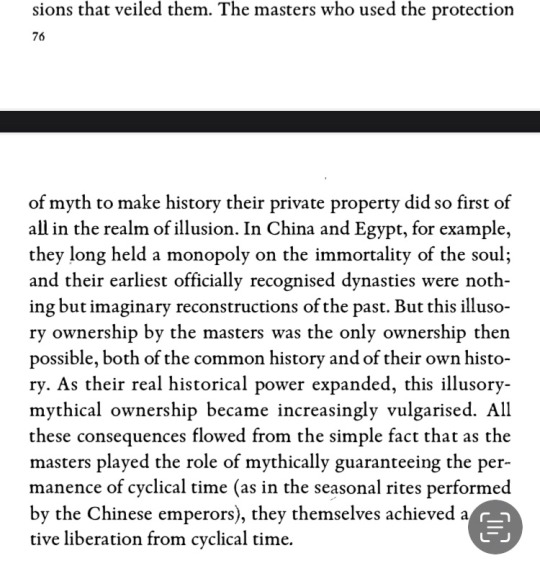
The masters who used the protection of myth to make history their private property did so first of all in the realm of illusion. In China and Egypt, for example, they long held a monopoly on the immortality of the soul; and their earliest officially recognised dynasties were nothing but imaginary reconstructions of the past. But this illusory ownership by the masters was the only ownership then possible, both of the common history and of their own history. As their real historical power expanded, this illusory-mythical ownership became increasingly vulgarised. All these consequences flowed from the simple fact that as the masters played the role of mythically guaranteeing the permanence of cyclical time (as in the seasonal rites performed by the Chinese emperors), they themselves achieved a tive liberation from cyclical time.
#revolutionary girl utena#rgu#rgu analysis#revolutionary girl utena meta#girl idk#i just wanted to talk about utena and marxism#if you have different conceptions of history and marxism than i do please don't attack me....talk to me first im nice#i don't get rageful over theoretical disputes and shit#👍
100 notes
·
View notes
Text
The way tsuwabuki ends up physically damaged and exhausted by serving nanami is a form of acknowledgement of how trying to become a prince damages the person in question because they are trying to reach an impossible standard. It's the same as when prince dios tried to save every girl from the world and anthy had to stop him because he was going to die if he continued. But, at the same time, the ones who try to be princes are taking the agency of others when deciding how and from what they have to be saved and tsuwabuki is one of the most obvious cases because he literally creates situations where nanami is in danger to rescue her.
So I think the series shows both the aspect of princehood that is more recognized by society (chivalry, nobility, selflessness) and the actual dark consequences and implications of that (taking the agency of others, damaging yourself in the process and the need of others to being in danger to fulfil your role/feel complete). The fact that there are people, or to be more exact princesses, who need being helped and saved constantly implies that the princesses are oppressed and, instead of change this, princes put a band aid to the problem. I think this relates to what @os-eclipses-tamen-son-yuri wrote about when boys become misogynistic men. When the boys grow up and accept the role of princes, they end up upholding the misogynistic system that creates gender oppression, even if that's not their intention because that's the real purpose of that role.
The way I see it is that RGU goes beyond critiquing the idea of toxic masculinity and implies that the problem is the binary masculine/feminine itself and the roles it puts on people.
#revolutionary girl utena#shoujo kakumei utena#rgu#rgu analysis#character: tsuwabuki mitsuru#character: prince dios#theme: princehood#theme: gender binary#r: nanami and tsuwabuki#r: tsuwabuki and dios#gru#mitsuru tsuwabuki#prince dios
141 notes
·
View notes
Text
Do you ever think about how… uncomfortable the end of the student council arc in RGU is, especially on rewatch? On a surface level yeah it’s awesome to see Utena gain confidence in herself and ruin Touga’s plans, but the conclusion she comes to in order to do so is EXACTLY what Akio needs her to believe.
Utena’s second fight with Touga leads us to think that she’s better than the other duelists. She desires the Rose Bride not because she “wants” her in a creepy way (like Saionji and even Miki do), but because she wants to be the kind of person who would save a friend from such a fate. However, what she’s done is fundementally the same as what everyone else has—she’s linked her sense of “self” to her possession of Anthy.
She no longer doubts herself, and therefore, no longer thinks critically about whether dueling is really a good idea. She doesn’t apologize to Wakaba or try to communicate with her, because she simply assumes that her friend is encouraging her on her journey to be a prince. She doesn’t try to find the mastermind behind the Black Rose Duelists because her only job is to fight off Anthy’s assailiants. She’s strengthened her resolve, but she has changed absolutely nothing about her approach to life. Ultimately, her ascent to the dueling arena in episode 12 is anything BUT a triumphant moment for her. It’s just the point where she refuses to believe that Anthy could be saved by anything other than a sword.
#I found ep 12 to be deeply unsatisfying on first watch and it took another viewing to figure out why#anyway idk if anyone cares lol#revolutionary girl utena#rgu#rgu analysis#rgu spoilers
111 notes
·
View notes
Text

My next analysis of Utena is the famous cow Transformation of Nanami. I know the theories behind "Nanami Was always an animal", "the egg Episode is about pregnancy", the egg Episode as a partly retelling of the OVA Angels Egg, and other theories. I would like to put forward another theory.

In Buddhism and Hinduism, roughly speaking, your biggest character flaw decides your next rebirth. If its fear, you Stay a human. If its Ambition, you become an asura god. Asuras are basically norse gods (its proven that the term aesir is derived from asura) or saiyans. If your biggest character Flaw is Anger and hatred, you get into Naraka/hell.

And if its delusion (or moha in sanskrit) , you become an animal next time. Delusion here is not about having untrue and outlandish beliefs but more a refusal to think and question your own beliefs. (Interestingly, in catholicism, the famous irish saint Patrick also told stories about people becoming animals via this character flaw and the bible helping them to overcome that.)
In that infamous cow Bell episode, other characters point out that this is a cow bell and not a fashion item from a Designer. But Nanami refuses to Listen and doubles down. This doubling down leads to her becoming more and more cow like.
The Nanamis Egg also shows Nanami not asking very obvious questions like how a mammal like her would be able to Lay an egg and instead going to extreme lengths for her belief.
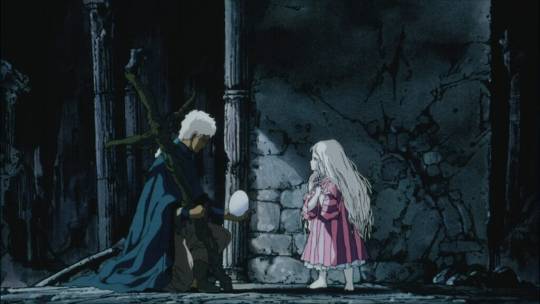
Nanamis egg shares some Thematic similarities with Oshiis Angels egg, a Surrealist OVA, where a girl Transports an egg. Many people see the egg as an Allegory for hope and religion in the wake of the Nietzschean "death of god" (see my previous analyses for that topic.)
In that movie, in the end, the male protector of the girl destroys her egg and many people interpret this act as a result of him seeing the egg as dangerous (in the sense of a flight from reality.) This fits here very well.

While both episodes are rather humorous and absurdist, Nanamis relationship with her brother is also a sign of delusion. She makes personal illusions, refuses to accept that her brother cares far less for her than she hopes, and she is even willing to commit acts of cruelty for the sake of maintaining her fantasy.
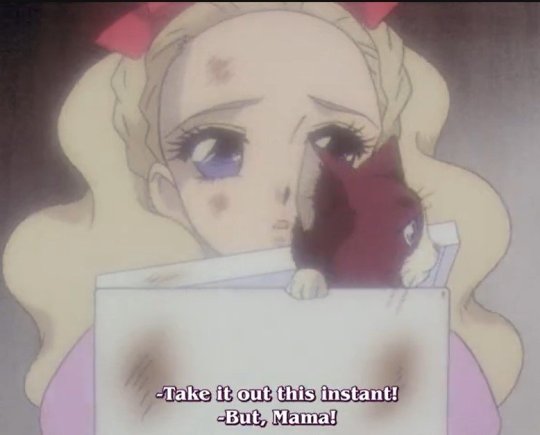
Best example is what she did to the cat.
Thus the connection between delusion and Nanami are pretty obvious.
But I need to mention that in Buddhism, delusion, among with greed and hatred are the 3 poisons which keep the circle of suffering from continuing. Which maintain the "revolution". Thus, everyone has delusions. In Utena, this is the case as well. Every character klings to personal illusions in the Story and these delusions are one of the Main reasons why they are at ohtori.
Another interesting aspect here is that the student council mantra tells you to "smash the egg shell" to destroy the illusion and to finally grow up and be free. In the egg Episode, Nanami does the opposite and tries to prevent the egg from cracking at all costs. She wants ro prevent her illusions from being smashed.
#anime#rgu analysis#analysis#utena tenjou#shoujo kakumei utena#revolutionary girl utena#nanami#buddhism#philosophy#religion
112 notes
·
View notes
Text
Been seeing a lot of discussion on rgu and race(and racism) recently which I think it's great. I plan to do a coherent little analisys on it some (not near) time, but for now, there's this thing that has been on my brain since my first watch;
About Akio, that has all control overs Ohtori being a brown man, and Anthy being the sufferer of all oppression not only for being a girl, but also clearly different in the academy for being brown (suffering with what can really be interpreted as racism, because of the constant sexualization, objectification and villifying of her). It's a contrast between the two siblings that has to do i'd say with the inherent links of types of prejudice: misoginy, racism, transphobia, homophobia, ableism go ideologically and systemically hand in hand.
Anthy is a brown girl that endured the thousand swords of humanitys hatred, prejudice. She carries with herself the open wound of all the girls under patriarchy, but not just this, she is vulnerable. A trafficked brown queer teenage girl victim of systemical abuse. And although the anime 'focus' its themes on gender, still, we can clearly pick up on multiple adding interpretations of Anthy as the representation of girls of marginalized groups.
Akio is not vulnerable, as he is an adult, an authority figure, the patriarch (and almost its god, when he paints himself as Dios) of ohtoris system, the academys Headmaster. But he is a brown man that, as we know, is also a marginalized group. And Akio, despite his positions as both teorically Dios and symbolically Lucifer, is also inserted in his own system. He is not the owner of Ohtori, and pardon me if I mix up the titles and positions names i'm vry tired, he's being a substitute to the actual guy, Kanaes father. So, even in this position so high of authority, we can see that even he has to play his own game and fall beneath someone with more power than him. Because that's how hierarchies and patriarchy works. And it makes me remember of when we see his and Anthys backstories:

So now, the part I've been thinking about since ever:
The place where Anthy and Akio stay is a wooden cabin with hay, which is similar to the ones that were built in america in the beggining of colonization. I apologize deeply, but I forgot about the name of the structure and the name of the article that discussed Anthy being brown, but I'll link it if I find it again. Anthy wears this very humble red cloth, that is indubtly more simple than Dios and the peoples clothing. It shows the beggining of ostracization. Dios clothing is white and similar to a tuxedo like the crowd is wearing, and anthys is red just like the rosebride dress.
For me, that seems to show us how the man and woman gender hierarchy is a colonizer idea.
Anthy dresses in a piece of cloth of the same colour of her bridal dress, because her as a brown girl is not a princess, not worth of value, a witch, and only valuable as an man serving object. And Akio, being now categorized as a man, even though he'a a child, dresses in a white tuxedo similar to the ones worn by grooms. He's higher in the hierarchy, but still used. And when Anthy helps her brother herself, despite being the lowest in the worlds hierarchy, the crowd attacks her and it consolidates the system that Akio knows dives fully into, as the master, but also not unharmed; at least from when he was a kid.
#i hope this makes sense. i struggle with organization in my rambles. a lot.#rgu analysis#akio ohtori#anthy himemiya#i am now thinking that this is too obvious and honestly i dint have to make a gigantic bad written analisys about#but thats what i do so i did it#also have i made a post about this before? i genuinely cant remember#sorry#rgu#revolutionary girl utena
96 notes
·
View notes
Text
a rant essay on mamiya/anthy/akio
mandatory spoiler warning for the anime Revolutionary Girl Utena, at the very least up through Episode 23, but honestly for the entire series
anyways. this is not a premeditated rant but it's something I haven't really seen anyone comment on before (and as an avid consumer of analyses/essays on RGU, that's saying something). throughout the black rose arc, we see anthy-as-mamiya several times. what I find interesting is, funnily enough, the hair color. hair color is something very important in utena, because no two characters really have the same color. shiori's purple and anthy's purple and akio's purple are all distinctly different shades. same as how miki and kozue, twins, have different shades of blue (i would even personally call kozue's hair indigo, not blue). even within the black rose arc, mikage and utena are different shades of pink. the only two important characters to share an exact hair color are akio and anthy's mamiya. one could claim that it's because akio and anthy are related, but their hair colors differ much more in reality, and anthy's mamiya is supposed to be a disguise. so, what gives?
my personal interpretation is that it's meant to be demeaning. anthy is pretending to be a boy, but in comparison to akio, she's small. a child. if you compare anthy's mamiya to dios, the hair is remarkably similar. dios was a weak child who overexpended himself trying to do what he couldn't- in this situation, because mamiya was terminally ill, that thing is live. anthy can't do that either, so of course she can play the role of someone in constant pain! she's being stabbed by swords!
it's not just a way of portraying akio seeing anthy as inferior to himself, though (hello, misogynists saying for years that women are just Missing what men have). it also reveals something about akio that isn't often talked about, I think. if anthy!mamiya's hair is meant to portray a connection to akio/dios, and mamiya is an illusion, then what does that say about akio?
let me put it another way: I did mention that "the hair is remarkably similar between anthy's mamiya and dios" but I meant the style. the thing I left out in my hair color match up is that if anthy!mamiya's hair matches akio's, it must also match dios. i know that's a "no shit, sherlock" moment because dios and akio are the same person but if anthy's mamiya and dios are incredibly similar, then they must also share that with akio. akio is portrayed as the opposite of dios; dios was the perfect prince, and akio is merely playing at it. akio is a horrible person, there's no doubt about that. but if dios was an illusion- something unreal, unsustainable, something fake- and mamiya was the same- then akio must be too. akio himself is an illusion. the planetarium projects the castle into the sky, and whatever the adult dios actually looks like, that's who's projecting akio. anthy did successfully save him, that's how he could continue to have so much power. but he's locked away in his coffin, and we don't even know what he looks like. tl;dr anthy pretending to be mamiya can be interpreted to mean that akio isn't real in a sense either i mean, seriously, who names themselves after Lucifer casually? it kind of has the same energy as Nick from Zootopia- "If I can't be the good guy, I'll be the worst guy you've ever seen. I'll be what you're telling me I am." naturally, Nick from Zootopia has some moral fiber, and it's questionable whether Dios ever had any, but that's a question for another day. what I mean is to say that Akio being like That is just his centuries-long maladaptive coping mechanism. unfortunately for him, he's not in a position where anyone would want to save him and brush off the heap of shit to find what would amount to, at best, a shitty mall "gemstone" underneath. could we have known/assumed some of this from the rest of the show? yes, we could have. i mostly find this so interesting because the distinction between the real person (character) in the coffin and the shell walking around the academy aren't often differentiated. i think the difference matters, and that it applies to everyone, even akio. I emphasize that I don't think Akio is a good person. I don't even know if I'd consider him redeemable, because Anthy's salvation comes in that he was tugging her strings to make her do awful things and put victims in his path. Then again, no character in Utena is really innocent. 🤷♀️ also I apologize if this is completely nonsensical! if anyone else has talked about the parallels between mamiya & dios, or this entire subject, I'd love to know
#revolutionary girl utena#shoujo kakumei utena#rgu#rgu analysis#utena#mamiya chida#anthy himemiya#akio ohtori#rgu spoilers#sku
56 notes
·
View notes
Note
i love kozue please talk to me about kozue
OMG YAY!! Alr. I have to pull up some of my notes from my last rewatch
So it actually took me quite a bit to really appreciate Miki and Kozue's character arcs because theirs is arguably the most subtle out of the the entire cast (which I understand may not be saying a whole lot, as Utena emphasizes a visual approach to storytelling, where everything is more or less completely out in the open for the viewer to relish-- it's just up to the audience to decide what those symbols mean). The thing that tripped me up about Kozue is that you can't really understand her until you've understood Miki, since her whole narrative niche hinges on her relationship with her brother, and of course given RGU's egalitarian disposition in regards to textual intent, however you've understood Miki will then inevitably color your perception of Kozue. That said! I don't think it's a completely one-sided dynamic, because of course Miki is impacted by Kozue's actions all the time. I just think there's a stricter analytical chronology to dissecting the twins, and that's a departure from the rest of the series' writing, and it makes them stand out a bit more.
Blue is assigned to three characters over the course of the series: Miki, Kozue, and then Ruka. Any thematic commonalities, though, appear to be entirely lacking at first glace; after all, all their personalities and archetypes are oppositional to each other. I definitely had a hard time figuring out this one, but I think my primary (and preliminary) conclusion as to their point of contention has to do with their status as accessory characters. Ruka appears with Juri as a masculine foil, Miki's own status as a member of the student council is consistently undermined by the greater authority of those around him, and Kozue attaches her social worth to her promiscuity. Of these three, Kozue exclusively is a woman, in addition to which she is in the transitional period of adolescence along with Miki, kind of representing an ambivalent force among Ohtori's constructs. She doesn't fully belong to any class of Ohtori's residents. Sure, she has a leaning, but it's just that-- a tendency set up to exacerbate extremity. It's also the binary complement to Miki's own nuances (here we can get into RGU's exploration of Childlike Purity but that deserves its own essay lol; the point I'm trying to get across is whatever Miki is, Kozue represents the other face of the coin).
The bulk of what I managed to gather from Kozue's character actually comes from her duel song, Utopian Paste Tense Incantation. The lyrics lay on really hard with nostalgic imagery and diction.

From this.
We can grasp the core tenant of her character motivation, that being that she's wanting to return to the past when she was figuratively and literally a child, presumably to before the incident with the failed piano recital (parallel that I haven't quite managed to place is the one related to sickness. Miki and Ruka both lost their metaphorical "other" because of illness. Hm). Here, the desire to return to the past is metaphorical in nature-- obviously she doesn't want to turn back time, she wants to replicate their past dynamic, reclaim her innocence, undo metamorphosis, reject the expectations of change the world demands of her.
**Note: The 7-5-3 referenced in some of the lyrics is referring to a Japanese rite of passage and annual festival celebrating the lives of children. Traditionally, girls aged 3 and 7, as well as 5 year old (occasionally 3 year old) boys undergo a ceremony that demarcates their transition into adolescence and womanhood/manhood. Here's the Wikipedia page on it if you're interested
But THIS. This is the catcher

There's a passing mention of an amusement park, which we come to associate with Akio.
The amusement park is the place where fantasies thrive. Its attractions are bound for the same path each and every time. There's no change at an amusement park, no revolution-- only the burden of comfort. And here is the fool who rides a carousel of violence round and round for eternity, the fallen prince. Kozue's own childhood with Miki was like this, and whether it's riding a merry-go-round or playing to his brother's naivete, she keeps herself going around in circles, chasing after a prince who always had his back to her.
Kozue's resentment is mutual- Miki does not approve of her sexual activity and projects his own ideal of the past onto Anthy- but it is not inhibiting. Rather, it is passive, and most of it manifests as self-hatred. She's manipulative, not in the way that she means to hurt Miki as a form of vengeance, but in the way that she advertises a very specific persona of herself to Miki. She's performing the role those around her demand from her (princess), to seek confirmation that somewhere in Miki is the brother who she believed was kind, gentle, and chivalrous. It's fear-- she's driven by the fear that Miki will completely reject her. She was abandoned once, after the recital, and she slipped out of one phase of her life into another. But surely, surely, Miki would still take her back, right? He hasn't changed like she did (or so, I suppose she believes). Her pursuit of an incestuous relationship is the apex of her complex-- it's unhealthy and mired in presumptions of intimacy that aren't conducive to her actually getting any closer to her brother. Similarly with the other sibling pairs, we see this type of sexual abuse used as a way to spotlight the harm that stems from endorsing the caricatures of masculinity and femininity that we're conditioned to view as desirable.
Kozue presses her own vision of the past onto Miki as much as he does to her. He's her "shining thing", her relic of nostalgic antiquity. And therein is their tragedy, wanting to move on in totally different ways, unable to see eye to eye, believing in a flawed history that was never there to begin with. Neither of them want to face the future and place blame on themselves for the loss of a memory that was never once genuine. They're birds who refuse to leave behind their nest, their birdcage. And I think the most fascinating element is the conclusion for Kozue's part of the story, in the scene at the end of Miki's Nest Box, where she finally calls out Miki for being a "coward" and walks away from him, leaving him to finish the nest box on his own. I interpreted that as being symbolic of her finally discarding her own preconceptions of Miki and coming to see him for who he is rather than merely as an extension of her personhood, disavowing the connotations of princeliness she'd come to expect from her brother. He cost them the duel and their attempt at reclaiming their past because of her intrusion on his idealistic fabrications, and seeing firsthand just how fragile his worldview was allowed her to break through her own.
There's so much I haven't addressed, but this is the gist of what I think she's all about? Do add more if you have any thoughts of your own! I will say. Common misconception for Kozue I see frequently is that she's actively aggressive towards Miki because she doesn't like him for reasons ranging from "she doesn't like being objectified by Miki" to "she's been irreversibly hurt emotionally by the incident with the recital" (and that Miki doesn't like Kozue because she simply doesn't fit into his own ideal of femininity). The objection here being the correlation of causality, as I don't necessarily think that Miki's objectification or even the recital are what *caused* Kozue to behave more coldly towards her brother. I hope my train of logic makes sense here because I tried my darndest to shoot down this specific misconception... uhmm. This took a long time to write LOL
#jin responds#Codeword: Revolution#rgu#sku#rgu analysis#sku analysis#kozue kaoru#kaoru kozue#this one deserves to be in main tags methinks
85 notes
·
View notes
Text
During Saionjis and Tougas sparring matches Saionji always has his hair up in a ponytail which I imagine is proper for the sport while Touga has his tied up in a way that probably doesn't come to be incredibly effective
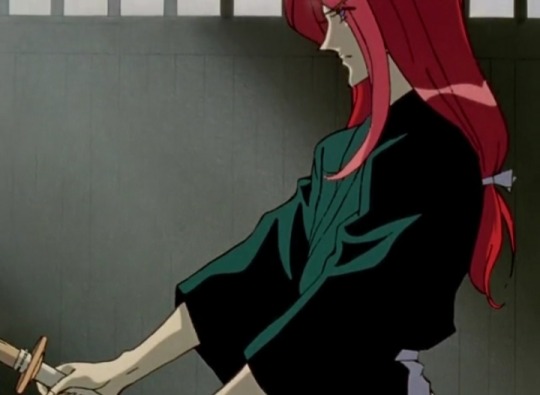
This could possibly be explained by Saionji trying in a way to appeal to Touga
At the end of the day, his desire to beat Touga comes from no other than his desire for him to be acknowledged by him, his self worth is tied to him in such a way that longing to measure up and longing for Tougas companionship become one and the same, he at that puts in an effort to do so properly
During their match in Episode 9, he yells, he emotes quite vividly, putting in something along the lines of passion into the act of competing with Touga
Touga in turn remains stone faced and quiet
In Episode 35 it is again Saionji driving the conversation, talking the most out of the two
Touga doesn't put in quite as much effort as Saionji does, we rarely see him practice and him having a match with Saionji garnering as much attention as it did the first time around, at least implies that if it is not the case that he doesn't engage regularly in the sport it is at least the case that he doesn't do so with Saionji
Him sparring with Saionji is an interest that they bonded over in childhood years is something seemingly monumental
It doesn't matter that how ineffectively his hair is tied up, the entire thing is bound together with a neat little bow like a present
This does also remind me of the fact that Saionji as a child used to wear his hair tied in much the same way as Tougas is now while Touga has not changed much about the way he ties his, also putting into mind that he does not view Saionji as being something he has to put an effort into more so than he did back then
Saionji dialed up the force he puts into competing, Touga has not
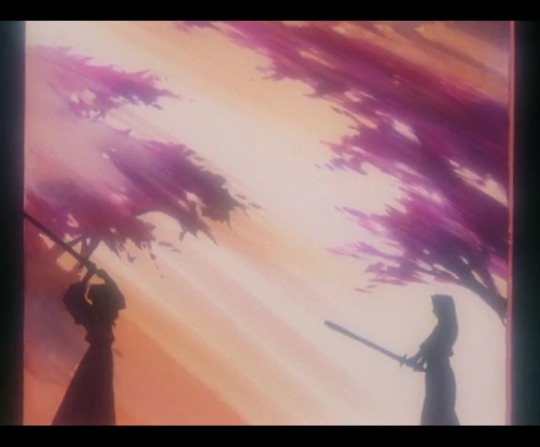
Here I see perhaps a reflection of Saionjis feeling that he and Touga are unequal not being truly present yet, they approach the match with the same amount of effort
However I find it notable that Saionji in comparison to Touga does not untie his hair afterwards
Potentially implying that he not only focuses on Touga as competitor, but also on Touga in terms of their relationship
Should we see the tied hair and the little bow as a projection of the past on the part of Saionji, another possible interpretation, it could also be notable that the lack of change in hairstyle correlates with his attachment to Touga on the basis of his memory of him, no matter how much he has changed time binds them together considering the experiences made with him are still very much linked to Touga as he is now since he remains the same person as they were made with back then wether he has changed or not
To add to this the bow to me also resembles the cloth Touga bandaged Saionjis hand in
50 notes
·
View notes